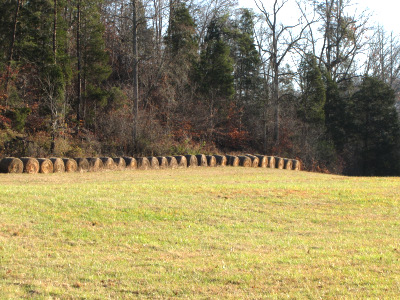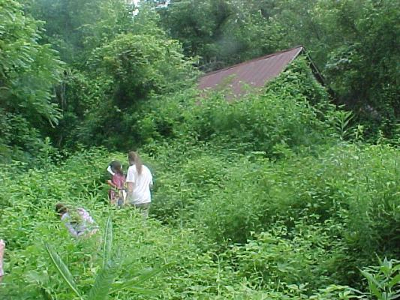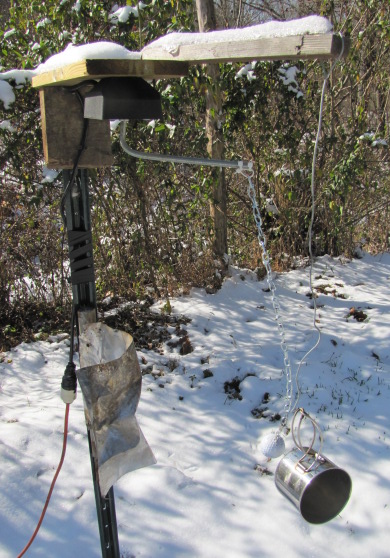
What to look for in a homestead
- Cheap land in an area with cheap land prices. Most people like to think of their home as an investment, but I would have to be in extremely dire straights to sell our beloved farm. Instead of looking for a property that will increase in value, I recommend that folks consider looking for land that they can buy without going into debt and which will maintain a low value so that their property taxes will stay within reasonable bounds. We pay just over $25 per month on property taxes but know people who pay twenty times that much. Do you really want to keep working a mainstream job just to pay property taxes?
- Rural, non-swanky neighborhood.
Although Appalachia has lots of problems, it
 also has a slew of
benefits. Around here, building codes are really only an issue in
cities, and even the mayor of a nearby town told Mark that he wouldn't
apply for a building permit for a project like our East Wing.
When I think of all of the hoops we could have had to jump through to
run our seat-of-the-pants operation, I feel very lucky that the long
arm of the law doesn't reach our farm. Our half mile driveway,
passable only by golf carts and four-wheel-drive vehicles, helps us
maintain that independence.
also has a slew of
benefits. Around here, building codes are really only an issue in
cities, and even the mayor of a nearby town told Mark that he wouldn't
apply for a building permit for a project like our East Wing.
When I think of all of the hoops we could have had to jump through to
run our seat-of-the-pants operation, I feel very lucky that the long
arm of the law doesn't reach our farm. Our half mile driveway,
passable only by golf carts and four-wheel-drive vehicles, helps us
maintain that independence.
- Plentiful water. I chose our farm in part because of the huge creek that runs along a boundary and the smaller creek that flows into it, but I didn't realize until we moved here how useful that water really is. Our climate is naturally wet, and many people farm without irrigating, but it's nice to have unlimited water at our beck and call. We also pump that water up into a storage tank to gravity feed to the house for unlimited wash water, which means we can just drink out of our well and not worry about running low on potable water.
 Starting with nothing. Although
at first it seems like it would have been easier to step into an
operational farm, in retrospect I'm very glad we started with nothing
except a briar patch. If our farm had come with a pasture,
I suspect we would have immediately bought sheep and a milk cow, and
then we would have had our hands full with serious livestock and
bushhogging weeds while we were still wet behind the ears. Having
to start new garden areas from scratch with hand tools also helped me
rein in my boundless garden dreams to more manageable
proportions. Each year, we add a bit more infrastructure as we
can afford the time and money, and the slow growth gives us time to
really learn all of the skills we need (and to enjoy the journey.)
Starting with nothing. Although
at first it seems like it would have been easier to step into an
operational farm, in retrospect I'm very glad we started with nothing
except a briar patch. If our farm had come with a pasture,
I suspect we would have immediately bought sheep and a milk cow, and
then we would have had our hands full with serious livestock and
bushhogging weeds while we were still wet behind the ears. Having
to start new garden areas from scratch with hand tools also helped me
rein in my boundless garden dreams to more manageable
proportions. Each year, we add a bit more infrastructure as we
can afford the time and money, and the slow growth gives us time to
really learn all of the skills we need (and to enjoy the journey.)
- A lot of the other factors
mentioned in Everett's post about why
he chose his property.
I won't repeat them all here, but they're very good points that folks
looking for land should consider.
All of that said, there
are some things I wish we had that didn't come with our property.
Our homestead is on the north side of a hill, so the sun doesn't peep
up over the trees on winter mornings until around 11 am --- a southern
exposure would have been nice. Two-thirds of our growing area is
nearly pure clay and half of that is waterlogged, so it will take a lot
of love before it becomes fully productive (but I have to admit that
building soil is a delight for me, so I almost consider this to be in
the "start with nothing" positive category.) I would love to own
the entire watershed, but the truth is that our 58 acres nearly always
feels big enough to let me spread my wings without worrying about the
neighbors, and I wouldn't want to be paying a big mortgage or working a
city job just to own another hundred acres.

Since I've already
written far too much, I'll point you to a previous lunchtime
series to answer your question about what
longer term things I wished we'd started earlier. The only thing I
would add to that list is getting up my courage to quit my outside job
sooner. Mark and I are quite adept at living simply, and I
suspect that if my job hadn't been draining our vitality, we could have
become financially
independent sooner,
giving us yet more time to sink into our farm.
And, to answer your last
question --- I wish we'd gotten our deer deterrents working sooner rather than
fencing at all! For all of the time and money we put into
building fences around the garden that the deer made their way through
anyway, we could have made dozens of deer deterrents and had a garden
as beautiful as the one I've enjoyed this fall.
Want more in-depth information? Browse through our books.
Or explore more posts by date or by subject.
About us: Anna Hess and Mark Hamilton spent over a decade living self-sufficiently in the mountains of Virginia before moving north to start over from scratch in the foothills of Ohio. They've experimented with permaculture, no-till gardening, trailersteading, home-based microbusinesses and much more, writing about their adventures in both blogs and books.
Want to be notified when new comments are posted on this page? Click on the RSS button after you add a comment to subscribe to the comment feed, or simply check the box beside "email replies to me" while writing your comment.
- Remove comment

- Remove comment
